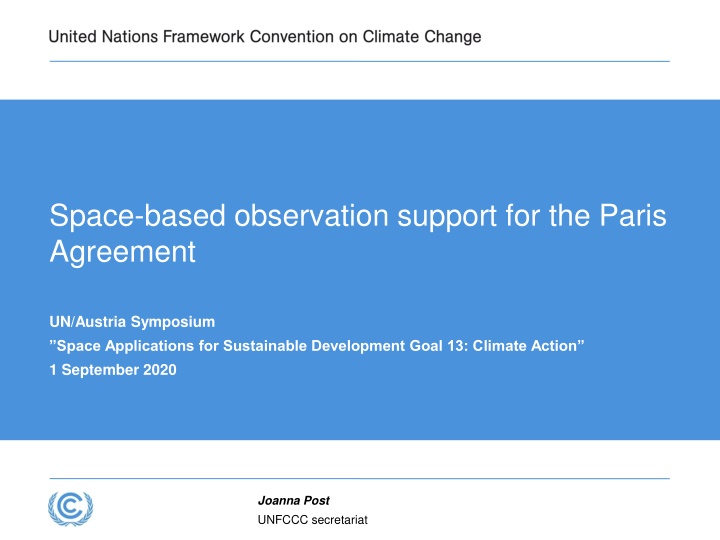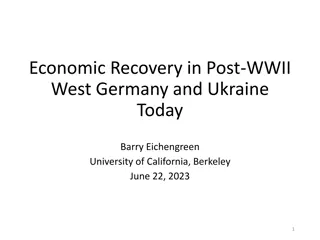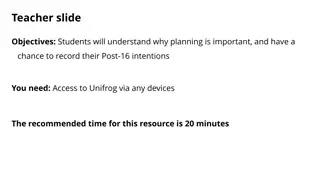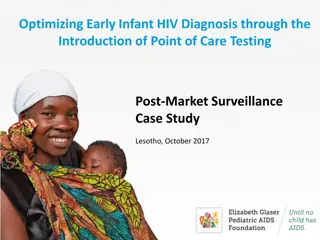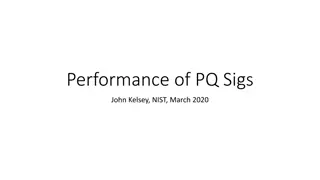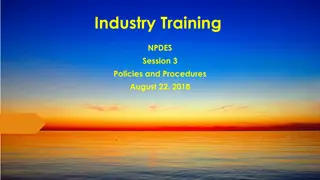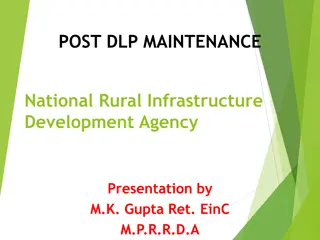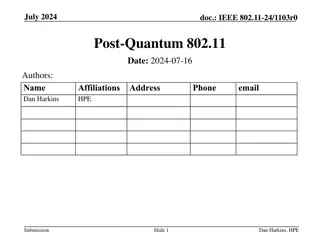Importance of Space-based Observation for Climate Action & the Paris Agreement
Utilizing space-based observation data is crucial for supporting the Paris Agreement and achieving sustainable development goals related to climate action. Observations play a key role in formulating commitments, assessing policies, and conducting research for combating climate change, as outlined in the agreements and protocols of the UNFCCC. The Paris Agreement's ambition cycle emphasizes actions for both mitigation and adaptation, with a focus on technology transfer, capacity building, and financial support. Monitoring the climate system through essential variables is essential for transparency, trust-building, and achieving global climate goals.
Download Presentation

Please find below an Image/Link to download the presentation.
The content on the website is provided AS IS for your information and personal use only. It may not be sold, licensed, or shared on other websites without obtaining consent from the author.If you encounter any issues during the download, it is possible that the publisher has removed the file from their server.
You are allowed to download the files provided on this website for personal or commercial use, subject to the condition that they are used lawfully. All files are the property of their respective owners.
The content on the website is provided AS IS for your information and personal use only. It may not be sold, licensed, or shared on other websites without obtaining consent from the author.
E N D
Presentation Transcript
Space-based observation support for the Paris Agreement UN/Austria Symposium Space Applications for Sustainable Development Goal 13: Climate Action 1 September 2020 Joanna Post UNFCCC secretariat
Overview Observations under the UNFCCC Paris Agreement GCOS implementation plan Some relevant conclusions Global stocktake Possible support by UNOOSA moving forward
Observations provide the foundation for commitments and decision making on climate change Article 4.1(g) Commitments Assessment Policy Research Observations Article 5 Research and systematic observation PARTIES SBSTA / SBI WMO COP/ CMA/ CMP SBSTA Research and systematic observation Agenda item - Research dialogue - Earth Information Day Climate services
Paris Agreement ambition cycle Action (Mitigation & Adaptation) Means of Implementation (Technology transfer, capacity building finance) Reported individual efforts NDCs 2020, 2025, 2030 Adaptation communication Long-term low- GHG emission strategy Transparency to build trust and confidence. Communicated individual efforts Enhanced transparency framework 2024 (+every 2 years) LDCs & SIDS asap GHG Inventory In 2020: AMBITION Progress on NDCs 2025 end date -> new NDC 5 year cycle Support provided and mobilized 2030 end date -> revised NDC Support needed and received Adaptation Loss and damage Inform updating NDCs in a nationally determined manner (progression clause) Global Stocktake 2023, 2028, 2033 Response measures IPCC assessments Action at national level! Collective progress towards purpose and long-term global goals
Climate Monitoring covers the whole climate system Observation of GCOS ECVs is vital to support the UNFCCC and the Paris Agreement s bottom-up, pledge and review architecture Weather Oceans Water Cycle Hydrology Energy Balance Cryosphere Carbon Cycle Atmospheric Composition Biosphere Work on ECV new! Not just surface and upper air data
GCOS Implementation plan and the Essential climate variables
The CEOS/CGMS WGClimate Architecture for Climate Monitoring from Space http://ceos.org/document_management/Working_Groups/WGClimate/WGClimate_Strategy- Towards-An-%20Architecture-For-Climate-Monitoring-From-Space_2013.pdf
Subsidiary body for scientific and technological advice some relevant conclusions Recognised increasing capability to systematically monitor GHG concentrations and emissions from space including CEOS Constellation Architecture for Monitoring Carbon Dioxide and Methane from Space to support the Paris Agreement, including development of national inventories WMO integrated GHG information system (IG3IS) as an innovative science-based framework that supports the needs of a broad range of users by combining atmospheric observations with other sources of information to enhance understanding of GHG concentrations and fluxes at multiple spatial scales Encouraged meaningful engagement among the space agencies, modellers and Parties in the implementation and use of these system Urged Parties and relevant organizations to continue to establish and support open data sharing, and the development of openly available, relevant and accessible data products Urged Parties to enhance the development of climate services - Making use of the value chain from observations to climate services to support and strengthen project development and decision-making on adaptation and mitigation, including by sharing knowledge and information through global, regional, national and local mechanisms
Global stocktake 1. Information collection and preparation 2021/2022 - 2023 SBSTA/SBI joint contact group Sources of input (inc. synthesis reports) 2. Technical assessment 2022 - 2023 Technical dialogue guided by 2 co-facilitators Consider IPCC assessments Separate SBSTA-IPCC special events 3. Consideration of outputs 2023 identify opportunities for enhancing efforts, challenges, good practices, and political messages HL events to communicate messages SB Chairs were invited to provide guiding questions for each of the 3 stages above CMA 19/CMA.1, para 15 After each GST - refine logistical and procedural elements
Global stocktake Mitigation Overall effect of NDCs State of GHG emissions and removals and mitigation efforts undertaken by Parties Adaptation State of adaptation efforts, support, experiences and priorities Finance flows and means of Implementation and support Finance flows and financial support Technology Capacity-Building Efforts on: Social and economic consequences of response measures (under mitigation) Adverting, minimizing and addressing loss and damage (under adaptation?) Inputs on equity Fairness consideration including equity as communicated by Parties in their NDCs
Potential use of space-based observations, in combination with in-situ, to support the Paris Agreement Support and maintain sustained observations for ECVs and climate indicators Support for mitigation: Continue to refine observation methods and tools, and provide open access to data and services. Provide the integrated systems to increase quality and decrease uncertainty to support Parties national GHG inventories. Identify GHG emission hotspots and other opportunities for reducing emissions. Measure changes in AFOLU/biomass. Support for adaptation: Continue to refine observation methods and tools, and provide open access to data and services. Develop indicators, for assessing progress on adaptation. Identify opportunities for linking MOI (capacity building, finance and technology transfer) Support countries observation capabilities Engage with regional initiatives to promote coherence between SDGs and UNFCCC (eg Samoa Pathway) Provide case studies of successful use of systematic observation Report progress to the SBSTA Support the GST Synthesis report
Thank you jpost@unfccc.int
